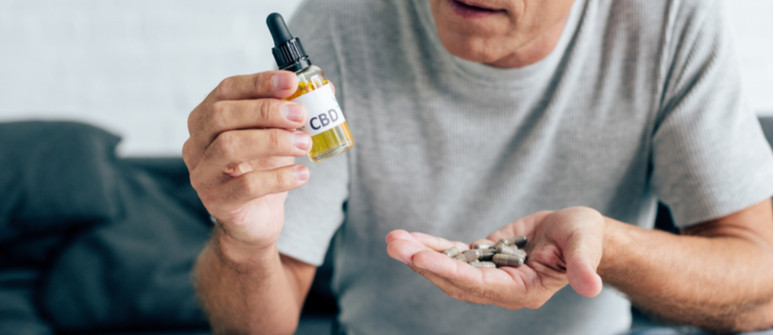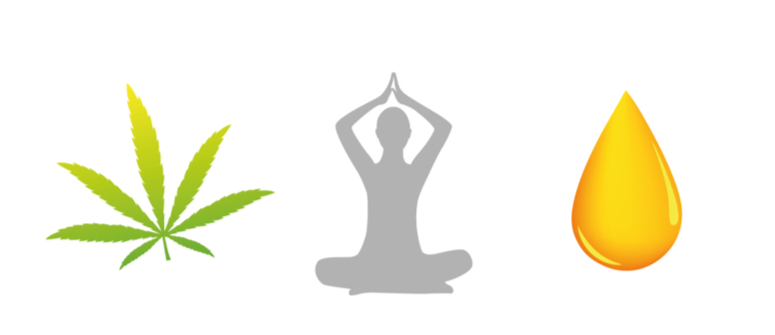Can you take CBD oil with medication?

For the most part, taking CBD oil comes with no significant health risks or side effects. However, like any other compound we put into our body, it has an opportunity to interact with other drugs we take. Specifically, CBD oil can affect the same systems other drugs work with, which can lead to the effects being altered in turn.
Generally speaking, on its own, CBD oil is considered safe as a wellness supplement, and the World Health Organization found that it has no severe side effects or addictive properties. That safety profile, however, gets a little more complicated if you happen to be taking other medications.
Specifically, if your medications interact with the cytochrome P450 enzyme family, you may find that CBD oil makes the medication stay in your system longer, giving it the effect of a larger dose in turn. As we go along, we’ll show you how your body processes CBD and explain exactly why it has that effect. Once we cover that, we’ll help you figure out how to consider that effect in relation to your medication regimen.
HOW THE BODY PROCESSES CBD OIL
To have a proper discussion about how CBD interacts with medication, we have to detail how it works with our bodies in general. See, unlike some other cannabinoids, CBD doesn’t have a strong binding affinity for cannabinoid receptors in the endocannabinoid system (ECS), which exists throughout our bodies and mediates many of our bodily functions.
CBD still has an effect on the ECS, but it's less direct. Instead of binding to CB1 or CB2 receptors, CBD inhibits our body’s production of fatty acid amide hydrolase (FAAH), a compound that collapses and weakens the anandamide in our system.
Anandamide, an internally produced endocannabinoid linked to feelings of motivation and pleasure, is also known to support the endocannabinoid system. In turn, CBD’s protection of the molecule via inhibition of FAAH has a notable effect on the ECS.
Second, CBD also alters the function of another anandamide inhibitor, fatty acid binding proteins (FABPs). Those molecules transfer anandamide to FAAH molecules for metabolisation, thus their inhibition also serves to benefit anandamide production and the overall endocannabinoid system in turn.

WHAT IS THE CYTOCHROME P450 ENZYME SYSTEM?
Now that we’ve explained how CBD interacts with our bodies, we should explain the other major factor in the cross-drug interactions we mentioned earlier: the cytochrome P450 enzyme system. This family of liver-based enzymes is charged with the task of breaking down foreign substances and sending them out of our bodies.
To be more specific, these enzymes are in charge of metabolising many of the drugs we use to treat our ailments. Looking further into things, you’ll also find that not every enzyme in the family is involved in the process. In actuality, it’s one type of enzyme, CYP3A4, that’s tasked with breaking down around 60% of clinically prescribed drugs today.
CAN CBD OIL AFFECT MEDICATION?
Along with breaking down those medications, CYP3A4 is also responsible for breaking down certain cannabinoids, including CBD. When it breaks down that particular cannabinoid, however, it ends up altering CYP3A4’s behaviour in relation to other substances.
More specifically, it turns out CBD can noticeably slow down the metabolisation of every enzyme in the cytochrome P450 system, including CYP3A4.
As a result, these enzymes take longer to break down any drug they’re meant to metabolise while you have CBD in your system. When that happens, you’ll find that your standard dose of any P450-metabolised drug will have a stronger effect than usual.
Vice versa, you may find that certain medications inhibit CYP3A4’s process in the same way. In those instances, if you take CBD, your body will likely have a harder time processing it as effectively, leading to the feeling of taking a larger dose.
It doesn’t do anything dramatic in most cases, but the combination of CBD and certain medications can sometimes lead to a variety of side effects, including nausea, drowsiness, diarrhoea, and fatigue (the latter two being common side effects of excessive CBD intake). In the worst cases, however, this combination can lead to one overdosing on the non-CBD substance.
WHAT MEDICATIONS DOES CBD OIL INTERACT WITH?
To avoid these potential side effects, it’s vital you make note of which medications have contraindications/interactions with CBD.
But how exactly can one figure out which drugs are metabolised by the P450 system? Well, you should always ask your doctor about those sorts of things, but there’s also a simple way you can more easily tell which medications are affected.
If the medication you’re taking has a warning against eating grapefruit or drinking grapefruit juice, you can safely assume you shouldn’t take it with CBD either. Simply enough, both grapefruit and CBD, along with watercress, goldenseal, and St. John’s wort, all inhibit the P450 enzyme system’s ability to metabolise drugs. It’s not the exact same effect, of course, but similar enough.
Considering that, if you’re taking CBD (or consuming anything else mentioned in the last paragraph), you should consider how it will interact with any of the following categories of drugs:
• Antibiotics
• Antidepressants
• Antihistamines
• Antipsychotics
• Steroids
• Calcium channel blockers
• NSAIDs
• Anti-epileptics
• Beta blockers
• HIV antivirals
• Antiarrhythmics
• Angiotensin II blockers
• Benzodiazepines
• Prokinetics
• Oral hypoglycemic agents
• HMG CoA reductase inhibitors
• PPIs
These are the most common drugs that interfere with CBD and vice versa, but it’s worth noting there are quite a few more out there that fall into that category. Be sure to consult your doctor about any of your medications that may interact with the P450 enzyme system.
IS IT SAFE TO TAKE MEDICATION AND CBD OIL?
With all this considered, the conversation narrows down to one question: is it safe to take medication and CBD oil at the same time?
Well, if your medication doesn’t have a grapefruit warning (or, in other words, doesn’t interact with the P450 enzyme system), you’re pretty much safe to proceed. There are many other factors at play when it comes to medications, though, so it’s worth asking your primary care doctor about your specific medication to make sure.
Even if it does interact with that system, though, not all hope is lost. Your doctor is trained to help you find a balance, and they’ll be able to give you a routine that includes both CBD and your regular medications. They’ll give you all the advice you need, so you need to make sure you ask for it in the first place.
.jpg)


.jpg)
